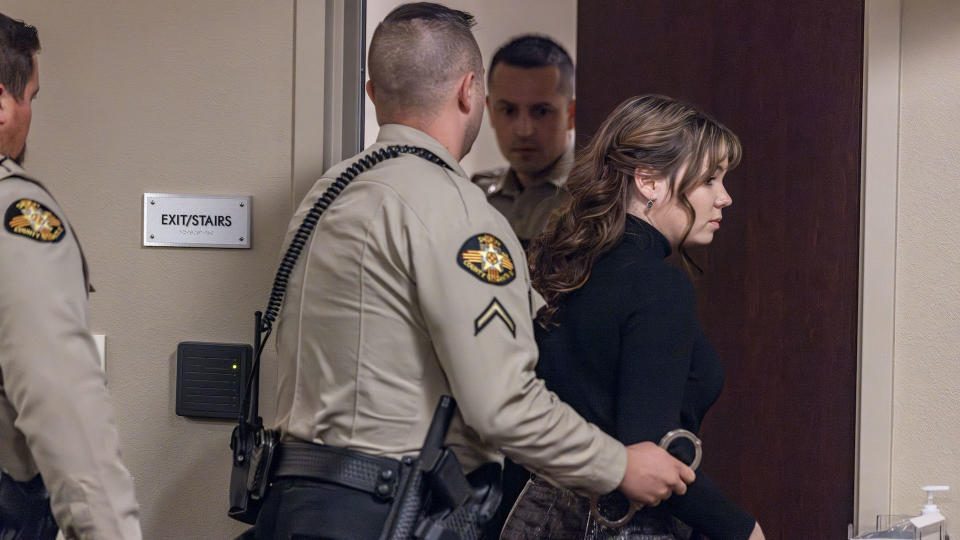Alec Baldwin Has an ‘Advantage’ After a Guilty Verdict for the ‘Rust’ Armorer

After a trial that lasted almost two weeks, it took a jury three hours to return a guilty verdict for involuntary manslaughter against Hannah Gutierrez-Reed, the armorer on “Rust.” After an investigation of cinematographer Haylna Hutchins’ death that took more than two years, it was a swift end. One case remains: Alec Baldwin, who held the gun that killed Hutchins on October 21, 2021.
Baldwin’s trial is set for July and it carries the same involuntary manslaughter charge. Like Gutierrez-Reed, he faces up to 18 months in prison if convicted. Gutierrez-Reed currently awaits sentencing while in custody.
More from IndieWire
Neama Rahmani, founder of Los Angeles-based personal injury firm West Coast Trial Lawyers and a former federal prosecutor, said he believes Baldwin’s case will be much harder to prosecute — but Gutierrez-Reed’s conviction only helped his case.
“It’s a win-win for Baldwin,” Rahmani told IndieWire. “The prosecution has proven that she’s responsible. [Baldwin’s attorneys] have a full preview of the evidence that’s going to come in during the next trial, and they can prepare their case accordingly… the second defendant always has an advantage.”
Two people can be found responsible for the death of Hutchins, he said, but proving that Baldwin was guilty of involuntary manslaughter beyond a reasonable doubt will be a different path and one that’s more difficult to navigate.
Conventional wisdom is both “Rust” cases should have been tried at once, Rahmani said, but a series of missteps by the state made things more complicated. Baldwin and Gutierrez-Reed were both charged with involuntary manslaughter in January 2023, but the initial charges had to be dropped because prosecutors misapplied a five-year enhancement. The New Mexico law that allows involuntary manslaughter charges to carry the enhancement didn’t exist at the time of the “Rust” incident.
The prosecution was forced to drop the charges before re-charging Baldwin a year later. “An amateur move,” Rahmani said. “The case has been botched from the beginning.”

The key issue in Gutierrez-Reed’s case was determining the source of live rounds on the film’s set. Evidence showed that she brought a loose bag of rounds leftover from her previous film shoot, “The Old Way.” She also told law enforcement she only checked the rounds “most of the time.” Also damning was the presentation of text messages sent by Gutierrez-Reed, Rahmani said, in which she was shown a picture of a round pulled from Hutchins and said she believed it was a dummy round.
Jason Bowles, Gutierrez-Reed’s attorney, tried to blame the production for not giving her enough time to check the dummy rounds and said “Rust” supplier Seth Kenney could be the source of the live rounds. Kenney testified that he rattle-tested each dummy round before providing it to the film and law enforcement could find no rounds at his facility that matched the one pulled from Hutchins.
Rahmani was not surprised that Gutierrez-Reed did not take the witness stand during her own trial. He believed she would have been “torn up” on cross examination and that prosecutors would’ve had “a field day.”
Baldwin, on the other hand, is very seasoned, and Rahmani said there is “almost no doubt” he will testify. “Jurors love celebrities,” he said. And if that doesn’t work, Baldwin has “some pretty good lawyers.”
The prosecution’s argument against Baldwin will center on the fact that he must have pulled the trigger on the gun. Baldwin has vocally denied that, first saying as much during an emotional interview with George Stephanopoulos. The FBI put out a report (and testified during Gutierrez-Reed’s trial) that the gun could not have discharged without the trigger being pulled. Rahmani said he believes Baldwin will be forced to walk back his assertion and a jury will be inclined to believe the FBI over his word.
Gutierrez-Reed’s defense pointed to an OSHA report that did not find her responsible and fined “Rust” producers a record amount for New Mexico. As a credited producer on the project Baldwin bears some burden in that regard, but that doesn’t address criminal liability.
Video evidence played during Gutierrez-Reed’s trial showed Baldwin gesturing with the gun even after the director yelled cut. Her defense also claimed Baldwin didn’t pay attention during safety training. Prosecutors are expected to say Baldwin should not have pointed the gun directly at Hutchins, even if he thought it was a cold gun, and should have checked the gun himself. SAG-AFTRA has come out in defense of Baldwin on that point, saying actors should not be responsible for that job.
Rahmani said Baldwin’s lawyers will argue that the Gutierrez-Reed jury has established who was supposed to check the gun.
“If you’re going to convict Baldwin, you have to pile it on,” Rahmani said.
Best of IndieWire
The Best LGBTQ Movies and TV Shows Streaming on Netflix Right Now
Guillermo del Toro's Favorite Movies: 54 Films the Director Wants You to See
Nicolas Winding Refn's Favorite Films: 37 Movies the Director Wants You to See
Sign up for Indiewire's Newsletter. For the latest news, follow us on Facebook, Twitter, and Instagram.


